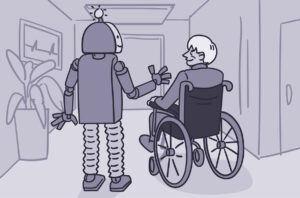Reasons to Visit an Emergency Room Instead of Urgent Care Clinic : No need to leave work
This is perhaps one of your biggest incentives for visiting a hospital emergency room rather than urgent care. If you’re already at work and something happens, there’s no reason why you can’t just go over to someone else’s desk and ask them to cover for you while you run off and see a doctor. In other words, they aren’t designed specifically with after-hours emergencies in mind. You have better access to doctors: This is another advantage that comes into play if you have an unexpected injury or illness during off hours. Since many urgent care centers are small-scale operations that operate more like private practices, it might be hard for them to pull in all specialists on short notice.
This is perhaps one of your biggest incentives for visiting a hospital emergency room rather than urgent care. If you’re already at work and something happens, there’s no reason why you can’t just go over to someone else’s desk and ask them to cover for you while you run off and see a doctor. In other words, they aren’t designed specifically with after-hours emergencies in mind. You have better access to doctors: This is another advantage that comes into play if you have an unexpected injury or illness during off hours. Since many urgent care centers are small-scale operations that operate more like private practices, it might be hard for them to pull in all specialists on short notice. An ER, however, should have everything ready at any time. They may not be as prompt: With more people coming through their doors every day, ER facilities tend to get backed up easily under normal circumstances—even without an influx of patients from evening office hours and weekend sporting events taking place simultaneously. Even so, they’re still bound by law to treat everyone in need as quickly as possible because lives could depend on how quickly action is taken.
This is perhaps one of your biggest incentives for visiting a hospital emergency room rather than urgent care. If you’re already at work and something happens, there’s no reason why you can’t just go over to someone else’s desk and ask them to cover for you while you run off and see a doctor. In other words, they aren’t designed specifically with after-hours emergencies in mind. You have better access to doctors: This is another advantage that comes into play if you have an unexpected injury or illness during off hours. Since many urgent care centers are small-scale operations that operate more like private practices, it might be hard for them to pull in all specialists on short notice. An ER, however, should have everything ready at any time. They may not be as prompt: With more people coming through their doors every day, ER facilities tend to get backed up easily under normal circumstances—even without an influx of patients from evening office hours and weekend sporting events taking place simultaneously. Even so, they’re still bound by law to treat everyone in need as quickly as possible because lives could depend on how quickly action is taken. That being said, life-threatening situations take precedence. Surgeries will take place regardless of appointments: Being rushed to surgery isn’t exactly what anyone would consider fun, but sometimes accidents happen that require immediate attention. If it turns out you’ve got appendicitis and your appendix needs to come out within twenty minutes or else risk death (likely), who cares if you have an appointment scheduled three days later?




